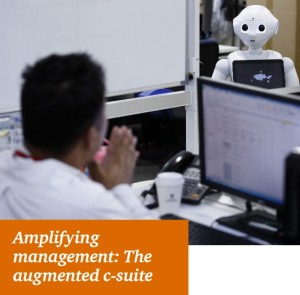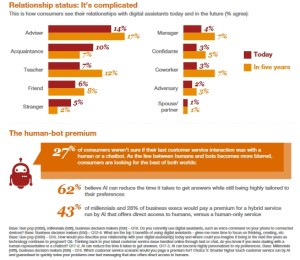A revolutionary partnership: How artificial intelligence is pushing man and machine closer together
With more than $5 billion in 605 deals of VC investment over last 2 years, artificial intelligence (AI) is poised to have a transformative effect on consumer, enterprise, and government markets around the world. While there are certainly obstacles to overcome, consumers believe that AI has the potential to assist in medical breakthroughs, democratize costly services, elevate poor customer service, and even free up an overburdened workforce. We dug deeper into those perceptions through an online survey of consumers and business decision makers, and an expert salon with thought leaders in the field. This original research unpacks key ways AI may impact our world, delving into its implications for society, service, and management.
…
The modern world has been shaped by the technological revolutions of the past, like the Industrial Revolution and the Information Revolution. The former redefined the way the world values both
human and material resources; the latter redefined value in terms of resources while democratizing information. Today, as technology progresses even further, value is certain to shift again, with a focus
on sentiments more intrinsic to the human experience: thinking, creativity, and problem-solving. AI, shorthand for artificial intelligence, defines technologies emerging today that can understand, learn, and then act based on that information. Forms of AI in use today include digital assistants, chatbots, and machine learning. Today, AI works in three ways:
Assisted intelligence, widely available today, improves what people and organizations are already doing. A simple example, prevalent in cars today, is the GPS navigation program that offers directions to drivers and adjusts to road conditions.
Augmented intelligence, emerging today, enables people and organizations to do things they couldn’t otherwise do. For example, the combination of programs that organize cars in ride-sharing services enables businesses that could not otherwise exist.
Autonomous intelligence, being developed for the future, establishes machines that act on their own. An example of this will be self-driving vehicles, when they come into widespread use.
With a market projected to reach $70 billion by 2020, AI is poised to have a transformative effect on consumer, enterprise, and government markets around the world. While there are certainly obstacles to overcome, consumers believe that AI has the potential to assist in medical breakthroughs, democratize costly services, elevate poor customer service, and even free up an overburdened workforce. Some tech optimists believe AI could create a world where human abilities are amplified as machines help mankind process, analyze, and evaluate the abundance of data that creates today’s world, allowing humans to spend more time engaged in high-level thinking, creativity, and decision-making. Technological revolutions, like the Industrial Revolution and the Information Revolution, didn’t happen overnight. In fact, people in the midst of those revolutions often didn’t even realize they were happening, until history was recorded later. That is where we find ourselves today, in the very beginning of what some are calling the “augmented age.” Just like humans in the past, it is up to mankind to find the best ways to leverage these machine revolutions to help the world evolve. As Isaac Asimov, the prolific science fiction writer with many works on AI mused, “No sensible decision can be made any longer without taking into account not only the world as it is, but the world as it will be.” As a future with AI approaches, it’s important to understand how people think of it today, how it will amplify the world tomorrow, and what guiding principles will be required to navigate this monumental change.
…
Human intelligence meets artificial intelligence
Beyond boosting productivity, business execs see AI contributing to major strategic shifts in their organizations. Two-thirds believe it will provide more information during decision-making. The same amount believe it will offer employees new types of roles managing and collaborating with machines. Operating as a new type of augmented intelligence, such positions would oversee and coordinate partnerships between man and machine. Sixty-seven percent of business execs believe leveraging AI will help humans and machines work together and combine both digital and human intelligences in the best ways possible. This combined man-machine hybrid is more powerful than either entity on its own. For example, Netflix’s human team created a proprietary manual on how to assess a movie that AI can use to define over 75,000 micro-genres for more nuanced, personalized recommendations.
Business execs also see potential for AI managers to improve life for employees. The majority believe employees wouldn’t mind working with an AI manager if it meant more flexibility and freedom to work from home (71%) and if it meant a more balanced workload (64%). Seventy percent also agree that AI has the potential to enable humans to concentrate on meaningful work, as well as indulge in more leisure. Humans will lean on their ability to navigate complex situations, motivate teams, understand rich social contexts, act with empathy and diplomacy, and influence others to move toward their vision—while machines automate the rest.
More in PwC Report:

